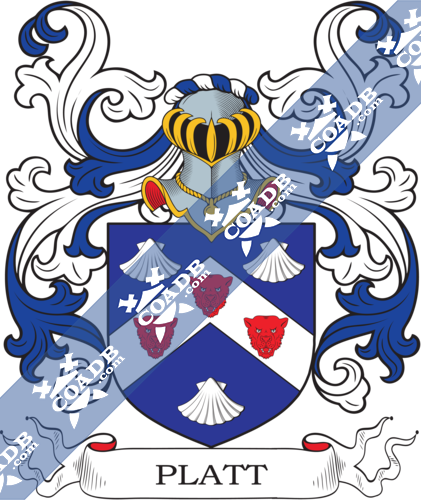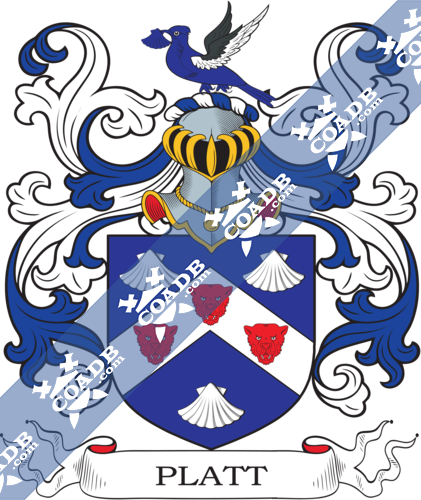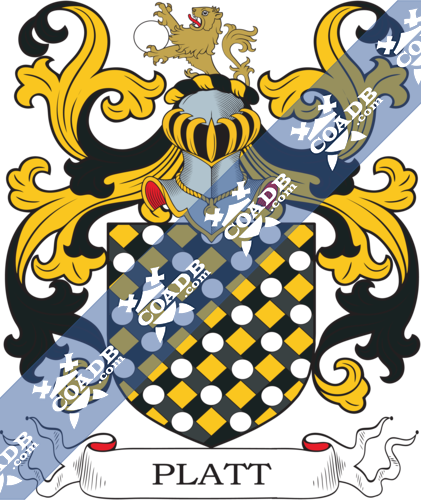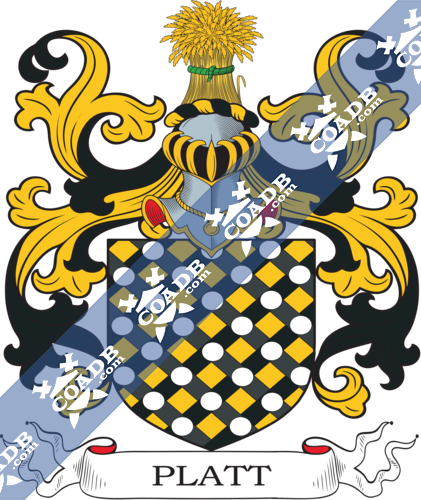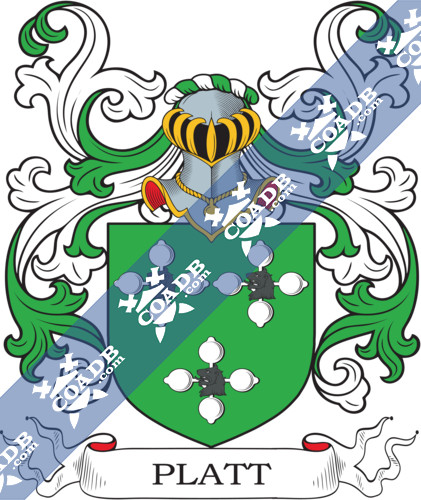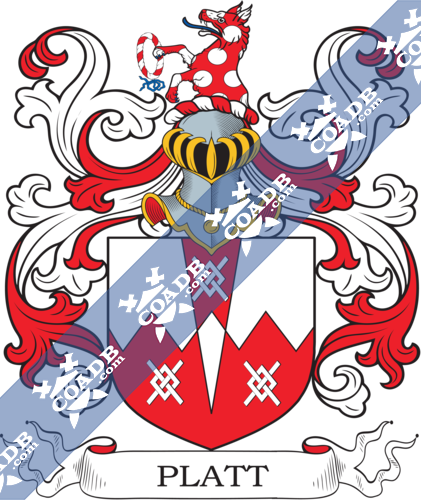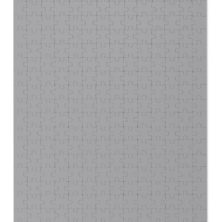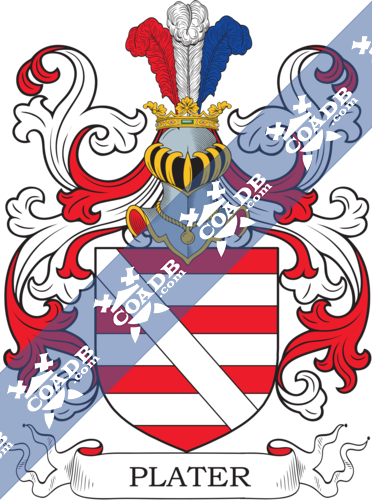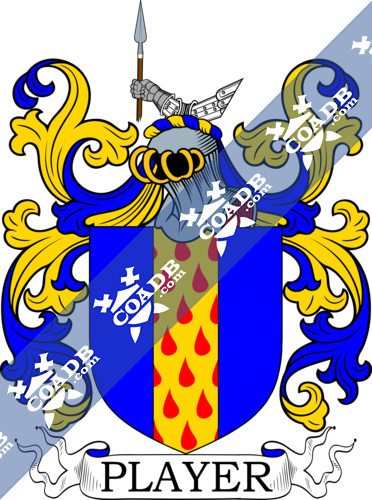Platt Family Crest, Coat of Arms and Name History
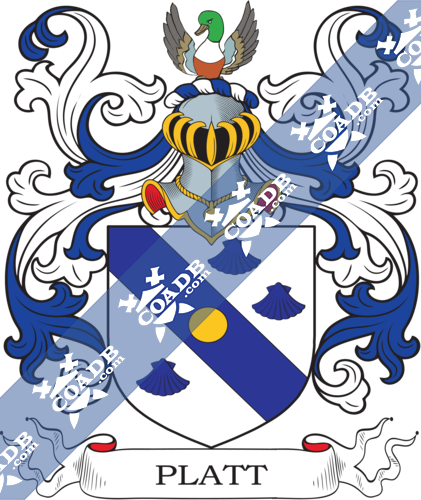
Platt Coat of Arms Gallery
Don’t know which Coat of Arms is yours?
We can do a genealogical research. Find out the exact history of your family!
Learn MorePLATT
The name Platt is an Anglo-Saxon surname which is believed to have originated from one of two sources, both topographical. The first, it is believed the name may be derived from medieval English, possibly a deviation of the word plaett or plat which translates to “inn” possibly referring to an inn keeper or someone who lived near an inn. The second source, suggest the surname Platt or any variation of its spelling, may be of French-Norse origin coming from the word plat meaning a “level” or “flat”.
Surnames in Britain prior to the Norman conquest were largely unheard of. In the small settlements and villages which existed during earlier times, residents found little need for surnames as everyone in these communities new each other and a given name would usually suffice. However, with the passage of time, population growth and expansions of communities as villages gave way to towns and cities, it became necessary to add a qualifier to a people’s names to distinguish them, one from another. Therefore one person may have been identified by their given name plus their occupation while another may have been identified by their given name and one of their parent’s names. The introduction of surnames by the Norman aristocracy after the invasion seemed to be the next logical step in this evolution. There was a boundless supply from which surnames could be formed, in addition to the use of patriarchal/matriarchal names or reference to the individuals occupation, there were things such as defining physical traits, a familiar geographical location or a topographical landmark found near the individuals home or birthplace, the name of the village in which the person lived, and so much more. Soon, surnames would come not just to represent an individual but whole families.
There often exists variations in spelling of many surnames, as with many given names which date back to the early centuries. The variation in spelling of both given and surnames during this time period can be attributed to a lack of continuity regarding guidelines for spelling which was compounded by the diversity of languages in use in European countries at this time. The variations in the spelling of the surname Platt include but not limited to; Platt, Plat, Platte, Plait, Plate, and Blatt among others.
The earliest record of any variation of this surname is that of John de la Platt which appears in the Worcester tax rolls from 1242 These rolls, were a series of census and tax records kept by the English Treasury by order of King Henry III, with the oldest dating back to the 12th century. They hold the distinction of being the oldest consecutive set of records detailing English governance in the United Kingdom. These records span a period of over 700 years and have proven invaluable to researches over the years. Additional tax rolls show records of Geoffrey de Platte from Lancashire in 1285, Johannes de Plattes from Yorkshire in 1397, and Robert Plattes from York in 1590.
The first recorded immigrant to America bearing the surname or any variation of the spelling was Gilbert Platt and his son Lawrence who arrived in 1635 and settled in Virginia. Peter Platt landed and settled in Virginia in 1702 and Samuel Platt arrived and settled in Virginia in 1703.
There were also many immigrants to the British Common Wealth countries of Canada and New Zealand bearing the surname Platt. Isabella Platt landed in 1834 and settled in Saint John, New Brunswick, Canada as did Alex Platt who landed in 1862 and settled in Victoria, British Columbia. Edmund and Elizabeth Platt and their children Walter and Alice landed in 1876 and settled in Wellington, New Zealand. George Platt landed in 1880 and settled Auckland, New Zealand.
Worldwide, the highest concentration of people with the surname Platt are found in the United Kingdom, Australia, the United States, New Zealand, and Canada. By state, the largest percentile of those with the surname Platt live in Florida, Utah, and South Carolina.
There are many persons of note who bear the surname Platt. One such notable person is General Sir William Platt who was born in Cheshire, England. He was a highly decorated and revered officer in the British Army. Platt attended Sandhurst Royal Military College, graduating in 1905, at which time he was commissioned to the army and was station in India on the North-West Frontier. For his meritorious service he won the Distinguished Service Order. During World War I, Platt fought in France and Belgium and was promoted to brigade-major. In 1939, Platt was appointed a Companion of the Order of the Bath and by the time England entered World War II, Platt had been promoted to major general. He spent the majority of World War II in North Africa. Platt retired from the army once the war was over.
Blazons & Genealogy Notes
1) (Plastow, co. Essex; granted 6 Feb. 21 Elizabeth). Ar. on a bend betw. three escallops az. a bezant. Crest—A shoveller, wings expanded ppr.
2) (Wigan, co. Lancaster). Az. on a chev. betw. three escallops ar. as many leopards’ faces gu.
Same Arms. Crest—A bird volant az. wings ar. and sa. holding in the beak an escallop of the first.
3) (London and Kentish Town, co. Middlesex; granted by Camden, Clarenceux, to Richard Platt, of London, brewer). Or, fretty sa. on each joint a plate. Crest—A demi lion ramp. ppr. holding in the paws a plate.
4) Same Arms. Crest—A garb or, banded vert.
5) Vert three quatrefoils ar. each charged with a lion’s head erased sa.
6) (Deanwater, co. Chester; granted to Robert Platt, Esq., of that place, son and heir of George Platt, of Stalybridge, Stockport). Motto—Labitur et labetur. Per fess dancettée ar. and gu. a pile and three frets, one and two, counterchanged. Crest—A demi wolf gu. semée of plates, armed and langued az. holding in the dexter paw a wreath ar. and gu.

